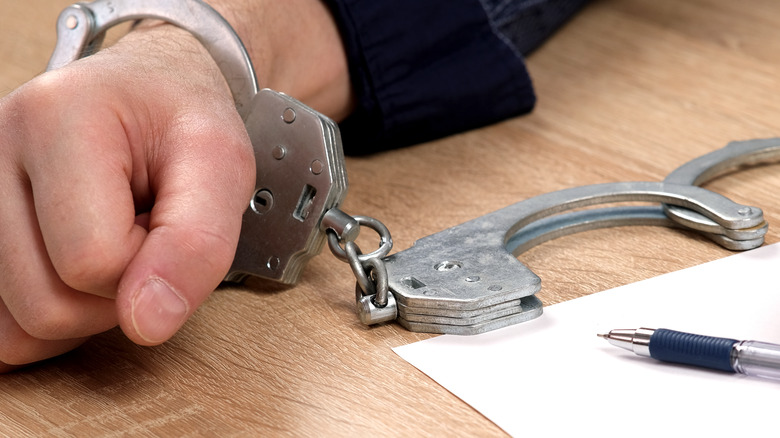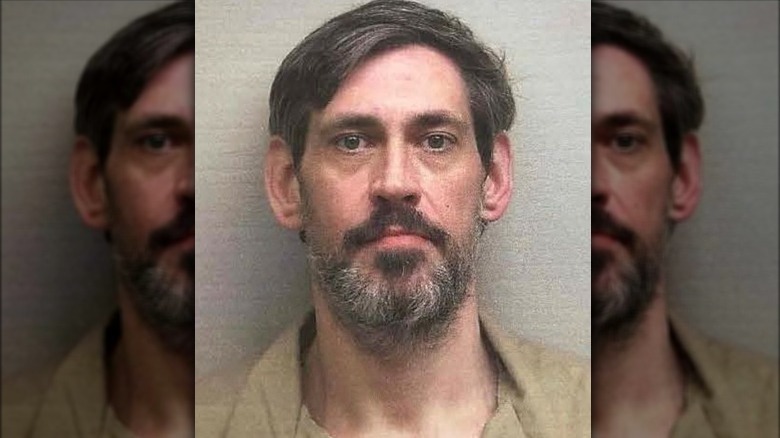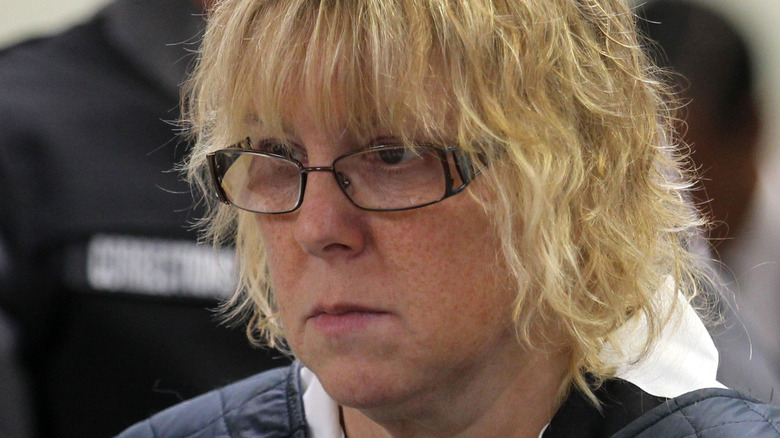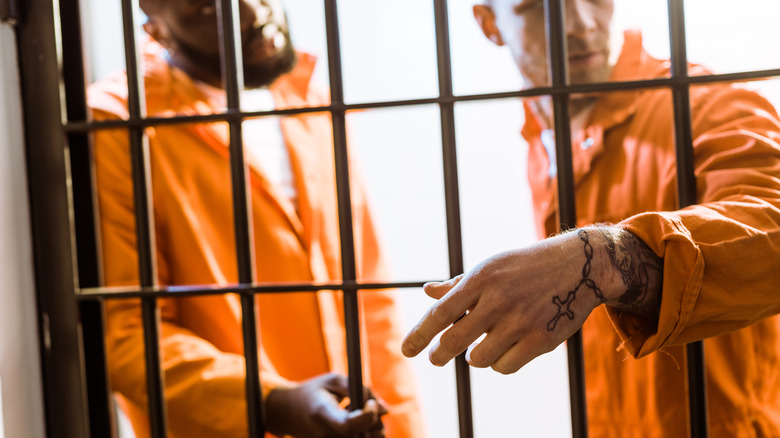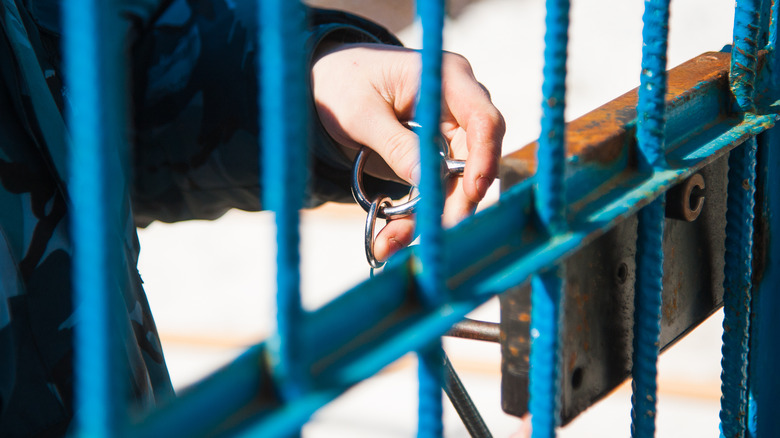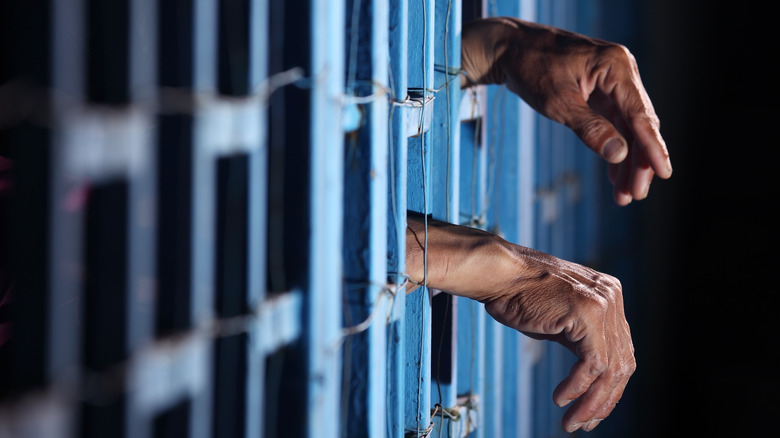The Truth About Relationships Between Prison Guards And Inmates
In late April. Alabama assistant director of corrections Vicky White is alleged to have assisted convicted felon Casey White (no relation) in his escape from prison. White was serving a 75-year prison sentence for attempted murder, among other charges, and was awaiting trial in an unrelated capital murder case. There's evidence that an inappropriate personal relationship between Vicky White and Casey White developed in the years leading up to the escape. While on the run, the couple may have even been married, according to Newsweek. After a multi-state manhunt and car chase, Casey White was taken into custody in Indiana. Vicky White died in a hospital from a self-inflicted gunshot injury, as the AP explains.
But just how common are inmate and prison guard relationships, and how close can two people be when one is free and one is in custody? Relationships between guards and inmates are not uncommon, as they can sometimes be between high-profile prisoners and those outside law enforcement; so much so, there's even a term for it: hybristophilia, or a sexual interest or attraction to those who commit crimes (per CNN). There's one significant obstacle, though, that prevents relationships like these from developing.
How close were Vicky White and Casey White?
The alleged relationship that developed between Vicky White and Casey White (above) is described as "special" by the Lauderdale County Sheriff's Office. The former corrections officer is said to have given Casey White preferential treatment while in custody. Few other details are known about the full extent of what transpired between the couple. What is known for certain is that Vicky White and Casey White seemed to have thoroughly planned their escape and their subsequent life on the run, per the AP.
What else is known about the alleged relationship between the two fugitives is that Vicky White stayed in contact with Casey White in a period when Casey White was incarcerated at a different facility. Casey White may have also committed crimes at that time to return to where Vicky White worked. Whatever the true nature of their relationship really was, it developed over the course of two years, per the Lauderdale County Sheriff's Office (via New York Post). Just prior to vanishing, Vicky White arranged her retirement from corrections, sold her home under market value, bought several firearms, and purchased the getaway car, which the couple later abandoned.
What is hybristophilia?
Although little is known about the mental state of Vicky White in the lead-up to her life on the run and tragic death, she was described as a model employee. Her behavior was also described as out of character. Some close to the situation speculate that she may have suffered a mental health issue or that she was under undue influence, according to NBC News. It's impossible to say for certain if Vicky White lived with hybristophilia, or sexual attraction and interest in criminals (via CNN). If she did, though, it would only be one example of the phenomenon's occurrence in law enforcement, or between felons and the general public.
Another well-known example of an alleged romantic relationship between a prison worker and inmate occurred in 2015, when prison worker Joyce Mitchell (pictured) helped two felons, Richard Matt and David Sweat, escape from detention. Mitchell later confessed to a close relationship with Matt, and had even arranged for Matt to kill her husband once Matt was on the outside. Mitchell said in her confession (via CNN), "Inmate Matt and I got along well. We talked every day and he treated me with respect and was nice to me. He made me feel special." From Ted Bundy to Charles Manson, there are many more cases of women who work outside law enforcement who fell in love and maintained relationships with convicted felons who were in custody.
What motivates relationships between inmates and guards?
Hybristophilia aside, it's hard to know for certain what motivates prison workers to fall in with inmates and sometimes, as a result, make risky decisions. Speaking to CNN, Dr. Casey Jordan, Criminologist and Professor of Justice and Law Administration at Western Connecticut State University, said that in these instances, anxiety over aging could be a factor. "[T]he loss of excitement in their lives is somehow filled by the attention of a Bad Boy ... they act just like a teenager and take unimaginable risks without any care of how it will end," Jordan said.
Dr. Arielle Baskin-Sommers, Associate Professor of Psychology and of Psychiatry at Yale University, added (via CNN) that human behavior is complex and there may be many reasons why someone would choose to enter into a relationship with a convicted felon. It's also possible that over time, free individuals who enter into romantic relationships will change their minds. "[D]epending on what motivated the behavior or psychiatric conditions they have, it absolutely could be when they're out of that context, or something else happens in their life, that they realize the error of their ways," Baskin-Sommers said.
Relationships of this type are increasingly common
Whatever the reason why relationships of this type develop, they're only growing in frequency. That's especially true as more women enter corrections and law enforcement, according to research from The Journalist's Resource. What's more, these relationships aren't always consensual. In 2014 the federal Bureau of Justice Statistics released a report indicating a significant increase in reported sexual abuse and harassment in law enforcement. Roughly half of those allegations were made by prisoners against prison staff and corrections officers.
Also according to The Journalist's Resource, a U.S. Department of Justice (DOJ) report stated that sexual relationships of any sort can lead to other forms of misconduct, such as extortion or prison rule violations. Per DOJ findings, compromised prison staff and personnel may smuggle contraband into their facility and accept bribes. They may even lie to federal investigators, or commit other serious crimes as a result of their sexual involvement with a prisoner, per the DOJ report.
Federal law prohibits sexual contact between prison workers and inmates
To help address the increase in sexual relationships between prison staff, personnel, and corrections officers, federal law bans sexual contact between law enforcement and convicted criminals, consensual or otherwise, per the 2003 the Prison Rape Elimination Act passed by Congress (via USA Today). Under the law, sexual relationships that might be otherwise considered consensual in different circumstances are consider non-consensual due to the fact that convicted felons are unable to provide consent. The same cannot be said for an inmate in custody who has to be convicted of any crime.
In 2005, the Department of Justice Office of Inspector General wrote (via USA Today), "Even if a sexual act would have been considered consensual if it occurred outside of a prison, by statute it is criminal sexual abuse when it occurs inside a prison," and that all forms of sexual abuse, harassment, or even sexual relationships that might be otherwise considered consensual threaten prison safety and operations. An example of this effect can be found in the case of Vicky White, who had an exemplary work record, according to Lauderdale County Jail Sheriff Rick Singleton. "It's just been a total shock," Singleton said (via NBC News).
